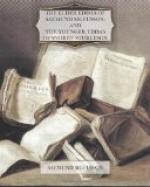100. Thou didst never from a contest come, as we had heard, where thou didst gain thy cause, or others overcome; ever wouldst thou give way, and never stand, lettest all pass off quietly, as ill beseemed a king.
Atli.
101. Gudrun! now thou liest. Little will be bettered the lot of either: we have all suffered. Now act thou, Gudrun! of thy goodness, and for our honour, when I forth am borne.
Gudrun.
102. I a ship will buy, and a painted cist;[116] will the winding-sheet well wax, to enwrap thy corpse; will think of every requisite, as if we had each other loved.
103. Atli was now a corpse, lament from his kin arose: the illustrious woman did all she had promised. The wise woman would go to destroy herself; her days were lengthened: she died another time.
104. Happy is every one hereafter who shall give birth to such a daughter famed for deeds, as Giuki begat: ever will live, in every land, their oft-told tale, wherever people shall give ear.
FOOTNOTES:
[Footnote 109: The messengers.]
[Footnote 110: It would seem that the original runes, as graved by Gudrun, had not been so completely erased as to leave no traces of them; but that they were still sufficiently legible to enable Kostbera to ascertain the real purport of the communication.]
[Footnote 111: Ham (hamr. fem. hamingia) a guardian angel, an attendant spirit.]
[Footnote 112: Here a gallows in our sense of the word, but usually a stake on a scaffold, to which the condemned to a death of torture was bound hand and foot.]
[Footnote 113: So great was their haste to land.]
[Footnote 114: She played a double game.]
[Footnote 115: Sigurd.]
[Footnote 116: The ancient usage of laying the body in a ship and sending it adrift, seems inconsistent with the later custom of depositing it in a cist or coffin.]
GUDRUN’S INCITEMENT.
Having slain Atli, Gudrun went to the sea-shore. She went out into the sea, and would destroy herself, but could not sink. She was borne across the firth to the land of King Jonakr, who married her. Their sons were Sorii, Erp, and Hamdir. There was reared up Svanhild, the daughter of Sigurd. She was given in marriage to Jormunrek the Powerful. With him lived Bikki, who counselled Randver, the king’s son, to take her. Bikki told that to the king, who caused Randver to be hanged, and Svanhild trodden under horses’ feet. When Gudrun heard of this she said to her sons:—
1. Then heard I tell of quarrels dire, hard sayings uttered from great affliction, when her sons the fierce-hearted Gudrun, in deadly words, to slaughter instigated.
2. “Why sit ye here? why sleep life away? why does it pain you not joyous words to speak, now Jormunrek your sister young in years has with horses trodden, white and black, in the public way, with grey and way-wont Gothic steeds?




